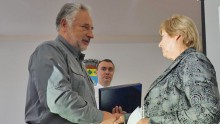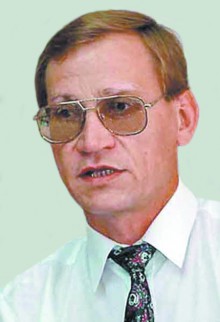By a decree signed on the eve of Independence Day, Petro Poroshenko posthumously bestowed the Order of Freedom on Donetsk region journalist Ihor Aleksandrov. The 15-year struggle to get the authorities to properly honor the journalist’s memory has ended in success (more details are available in our article “15 Years of Impunity,” published in Den’s Nos. 86-87, 2016). He is called “a second Gongadze,” but the Ukrainian media, despite the astonishingly brazen nature of the murder which occurred in 2001, have shown no desire to put the Aleksandrov case on their news agenda and to clarify the cause-effect relationships. The parallels with the case of Georgy Gongadze are not accidental, because instigators of neither murder have been punished.
Let us recall that Aleksandrov was chief manager of TOR TV company in the city of Sloviansk, Donetsk region, and presenter of his own program “Without Retouch,” which exposed the corrupt links between law-enforcement agencies and criminal gangs in the Donbas. The murder occurred on the eve of the broadcast in which the journalist had intended to show photos of a son of Viktor Pshonka, then serving as Donetsk regional prosecutor, accompanied by leaders of a Kramatorsk-based criminal gang. He was attacked on the stairs of the broadcaster’s office and savagely beaten with baseball bats. Following the attack, he died in hospital on July 7, 2001 without ever regaining consciousness.
“The struggle for perpetuating the memory of the journalist took a long time, as many as 15 years. My desire to see it happening was stronger before, maybe it would have been more noticeable and dignified then. Now, it comes as a post facto award, offered to placate us. Still, it is a great achievement even so. I do not want to blame the government, but I am confident that there are people who were interested in delaying this process or even ignoring the Aleksandrov issue altogether,” his widow commented for The Day immediately after the presidential decree’s publication.
Commemoration of Aleksandrov should not end with presentation of the Order of Freedom, all his family members who were interviewed by The Day maintained. Past year, his name was perpetuated in the names of a street and an alley in Sloviansk, while journalists who care about his memory planted a memorial row of trees in the city park. This October, we will learn the names of the winners of the Aleksandrov Memorial Donetsk Regional Journalism Contest, which the regional state administration plans to make an annual event.
The Sloviansk journalist’s name is carved in gold letters on the Journalists Memorial in Washington’s Newseum. The Day asked experts to assess Aleksandrov’s family and his fellow journalists’ reactions to the Order of Freedom having been awarded as well as current trends reflected by the Aleksandrov case.
“KUCHMA SURRENDERED THE DONBAS TO LOCAL CRIME BOSSES”
Ivan KAPSAMUN, Den’s politics section editor:
“The brazen and demonstrative murder of Aleksandrov came as a result of impunity enjoyed by criminals involved in the Gongadze-Podolsky case. Unfortunately, the tradition of physical elimination of journalists in independent Ukraine stretches back to the 1990s. One can recall the murder of well-known and influential Odesa journalist Yurii Derevianko in 1997. Of course, 2000 was a dark year, featuring kidnapping and assault on journalist and public figure Oleksii Podolsky in June, and then identically organized kidnapping and murder of Gongadze in September. Despite the evidence offered by the Melnychenko tapes and statements of Podolsky himself, who accused Leonid Kuchma and Volodymyr Lytvyn of these crimes, their perpetrators, especially those in high positions of power, still felt completely untouchable. This could not but embolden the murderers of Aleksandrov, especially since Kuchma effectively surrendered the Donbas to local crime bosses.
“And even today, after so many years, despite the high profile and worldwide publicity of the Gongadze-Podolsky case, we have not seen it achieving a closure. This shows that we still live, so to say, in the 1990s, when Kuchma presided over setting up the basic rules of a clan-oligarchic system. Those breaking these rules were eliminated. Aleksandrov became yet another victim of this system. It is nice to see the current government finally paying attention and awarding posthumously the Order of Freedom to the journalist, but I would like to see their concern about honoring Aleksandrov’s memory manifested in practical actions as well, because the real instigators of the murder have still not been named and punished. The Aleksandrov case is yet another marker, which along with the Gongadze-Podolsky case tests people’s honesty and still keeps us in the past.”
“IT IS TOO SOON TO FEEL SAFE”
Serhii HARMASH, journalist, chief editor of the OstroV website, author of an investigation in the murder of Aleksandrov:
“For as long as 15 years, the government avoided the issue of bestowing an award on the murdered journalist and resisted it. One can recall the serial failure of the Sloviansk City Council to name a street after Aleksandrov and sabotage on the part of the regional administration. The reason for it was the fact that many Yanukovych-era officials remained in office. The issue of granting the title of Hero of Ukraine to him is already moot from the legal perspective, but we must prevent him being forgotten. After all, even many journalists do not know who he was. And this is despite the fact that it is due to Gongadze and Aleksandrov’s sacrifices that we can now operate freely. The Gongadze case is naturally much higher in profile. His name has become a political banner of struggle against Kuchmism, because the case involved the top national leadership. Meanwhile, the murder of Aleksandrov was a handiwork of regional potentates, so people paid criminally little attention to it. We saw the consequences of it in a decade.
“A lot of unanswered questions remain, and many perpetrators still have not been held responsible. It should be remembered that the instigators of the murder have not been brought to justice, like Pshonka, former prosecutor general who was Donetsk regional prosecutor at the time of the murder; Volodymyr Malyshev, then head of the Donetsk police, and many lower-ranking law-enforcement officers who fabricated evidence in that case. Worse still, some of them still work in law-enforcement or government structures. For example, Colonel Ihor Kryvolapov, who had been detained for fabricating evidence of Yurii Verediuk’s guilt [Verediuk was falsely accused of killing Aleksandrov at an early stage of the investigation. – Ed.], now works in the Donetsk Oblast State Administration. While such things are possible, it is too soon to feel safe.”
“MANY FAMOUS JOURNALISTS HAVE IGNORED THE ALEKSANDROV CASE”
Mykola OMELCHENKO, public figure and the initiator of the campaign to grant Aleksandrov the title of Hero of Ukraine:
“The fact that the award came very late is a fact, and a shameful one to boot. Although I did see tears in Liudmyla Aleksandrova’s eyes [Aleksandrov’s widow. – Ed.]. To wait for it for 15 years must have been an extremely exhausting experience. But the award finally coming should largely be credited to the current president. Since I spoke at the funeral meeting and proposed to grant Aleksandrov the title of Hero of Ukraine, we have had four presidents. Of course, Kuchma could not grant it after the tragedy and recognize it as a political murder. The team that held power then and the team of murderers were heavily intertwined organizations, linked in a single chain going to the very top.
“President Viktor Yushchenko relied on Dmytro Tabachnyk’s team, while Viktor Yanukovych certainly was not going to honor the memory of a journalist who was killed by Yanukovych’s fellow Donetsk gangsters. But total impunity is still prevalent in this country, and it is critically dangerous. Just like those who were calling for separatism in the Donbas back in 2004 have not been brought to justice, those responsible for high-profile murders have not been punished either.
“I also have to say an unpleasant thing about many prominent journalists whom I contacted when the Presidential Administration deliberated on the award for Aleksandrov. I personally wrote to many of them asking them to support granting him the title of Hero of Ukraine, to raise this issue. None of them answered, and none offered any support. Moreover, I know that some were outraged at me daring to contact and disturb them. This is a very sad situation in our journalistic community at the moment.
“If journalists will respond to such issues like they have done in the Aleksandrov award case, such tragic murders will continue. The objective of the media must be delivering truthful and important information so that the public knows and the authorities react.”









